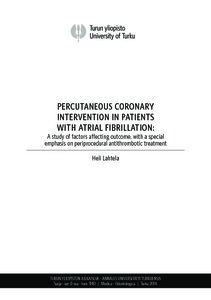Percutaneous Coronary Intervention in Patients with Atrial Fibrillation: A Study of Factors Affecting Outcome, with a Special Emphasis on Periprocedural Antithrombotic Treatment
Lahtela, Heli (2014-10-31)
Percutaneous Coronary Intervention in Patients with Atrial Fibrillation: A Study of Factors Affecting Outcome, with a Special Emphasis on Periprocedural Antithrombotic Treatment
Lahtela, Heli
(31.10.2014)
Annales Universitatis Turkuensis D 1140 Turun yliopisto
Julkaisun pysyvä osoite on:
https://urn.fi/URN:ISBN:978-951-29-5887-0
https://urn.fi/URN:ISBN:978-951-29-5887-0
Kuvaus
Siirretty Doriasta
ei tietoa saavutettavuudesta
ei tietoa saavutettavuudesta
Tiivistelmä
Antithrombotic treatment of patients with atrial fibrillation (AF) undergoing percutaneous coronary intervention (PCI) is a delicate balancing between the risk of thromboembolism and the risk of bleeding.
The purpose of this dissertation was to analyze current antithrombotic treatment strategies at the periprocedural stage and report outcomes in-hospital and at 1-month follow-up, and to evaluate the effect of renal impairment and predictive values of various bleeding scores on 1-year outcome after PCI in patients with AF.
The first article was based on retrospective data from 7 Finnish hospitals between 2002–2006 (n=377), while the others were based on a prospective 17-center European register (AFCAS) gathered between 2008–2010 (n=963).
The main findings in patients with AF undergoing PCI were: The use of glycoprotein IIb/IIIa inhibitors during PCI was associated with a four- to five-fold increase in the risk of major bleeding (I). Uninterrupted warfarin treatment did not increase perioperative complications and seemed to decrease bleeding complications compared to heparin bridging (II). Already mild renal impairment (eGFR 60–90mL/min) was associated with a 2.3-fold risk of all-cause mortality during the 12 months following PCI (III). Major adverse cardiac events occurred in 4.5% and bleeding complications in 7.1% of patients in the AFCAS register by 1-month follow-up (IV). In a study of patients in AFCAS register, all currently used bleeding risk scores were poor predictors of bleeding complications by 1-year follow-up (V).
The findings will help improve treatment strategies for this fragile patient population with a high risk of bleeding and thrombotic complications.
The purpose of this dissertation was to analyze current antithrombotic treatment strategies at the periprocedural stage and report outcomes in-hospital and at 1-month follow-up, and to evaluate the effect of renal impairment and predictive values of various bleeding scores on 1-year outcome after PCI in patients with AF.
The first article was based on retrospective data from 7 Finnish hospitals between 2002–2006 (n=377), while the others were based on a prospective 17-center European register (AFCAS) gathered between 2008–2010 (n=963).
The main findings in patients with AF undergoing PCI were: The use of glycoprotein IIb/IIIa inhibitors during PCI was associated with a four- to five-fold increase in the risk of major bleeding (I). Uninterrupted warfarin treatment did not increase perioperative complications and seemed to decrease bleeding complications compared to heparin bridging (II). Already mild renal impairment (eGFR 60–90mL/min) was associated with a 2.3-fold risk of all-cause mortality during the 12 months following PCI (III). Major adverse cardiac events occurred in 4.5% and bleeding complications in 7.1% of patients in the AFCAS register by 1-month follow-up (IV). In a study of patients in AFCAS register, all currently used bleeding risk scores were poor predictors of bleeding complications by 1-year follow-up (V).
The findings will help improve treatment strategies for this fragile patient population with a high risk of bleeding and thrombotic complications.
Kokoelmat
- Väitöskirjat [3099]
